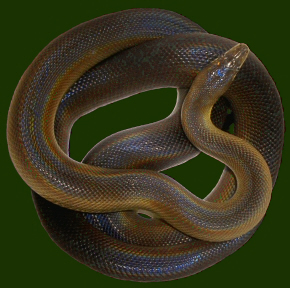

Description
 Liasis fuscus is a medium sized python, growing to lengths of 5-7ft on average. Water pythons are dark, patternless snakes ranging from dark brown to nearly black dorsally. The ventral surface is white on the chin and transitions to various shades of yellow on much of the rest of the ventral surface. The ventral surface of the tail is dark, in stark contrast to the rest of the belly.
Liasis fuscus is a medium sized python, growing to lengths of 5-7ft on average. Water pythons are dark, patternless snakes ranging from dark brown to nearly black dorsally. The ventral surface is white on the chin and transitions to various shades of yellow on much of the rest of the ventral surface. The ventral surface of the tail is dark, in stark contrast to the rest of the belly.
 Water pythons exhibit some morphological characteristics which are consistent with their semi-aquatic lifestyle. This species shows a reduction in its thermoreceptive pits as well as more subtle changes in the head structure of some specimens. The position of the eyes in these specimens is shifted slightly higher, similar to what is seen in other semi-aquatic species.
Water pythons exhibit some morphological characteristics which are consistent with their semi-aquatic lifestyle. This species shows a reduction in its thermoreceptive pits as well as more subtle changes in the head structure of some specimens. The position of the eyes in these specimens is shifted slightly higher, similar to what is seen in other semi-aquatic species.
Habitat
_thm.jpg) As its common name suggests this species is primarily associated with the various water sources in its range both permanent and seasonal. The many seasonal floodplains and billabongs, lakes and rivers of Australia's top end are all prime habitat for water pythons. This region is highly season with a very pronounced wet season. It’s during this we season that the water python’s habitat grows exponentially and these pythons become very aquatic in their habits. During the wet season these habitats can be very productive and in some locations can lead to very high population densities. One such place is Fogg Dam Northern Territory, where the water pythons represent one of the highest concentrations of vertebrate predators in the world.
As its common name suggests this species is primarily associated with the various water sources in its range both permanent and seasonal. The many seasonal floodplains and billabongs, lakes and rivers of Australia's top end are all prime habitat for water pythons. This region is highly season with a very pronounced wet season. It’s during this we season that the water python’s habitat grows exponentially and these pythons become very aquatic in their habits. During the wet season these habitats can be very productive and in some locations can lead to very high population densities. One such place is Fogg Dam Northern Territory, where the water pythons represent one of the highest concentrations of vertebrate predators in the world.
Distribution
 Liasis fuscus has a wide distribution in the tropical north Australia, from Broome in Western Australia to the coast of central Queensland in the east.
Liasis fuscus has a wide distribution in the tropical north Australia, from Broome in Western Australia to the coast of central Queensland in the east.
This species also has a limited distribution in southern New Guinea, from Merauke, Irian Jaya eastward through the lowlands of Western Province, Papua.
Projects
I am currently working with Queensland Australian specimens. This has become one of the rarest pythons in US collections. Though they have never been common, recent years have seen a decrease in captive breeding of Liasis fuscus. It is now quite rare to find any specimens of fuscus available, much less animals with a known provenance.
